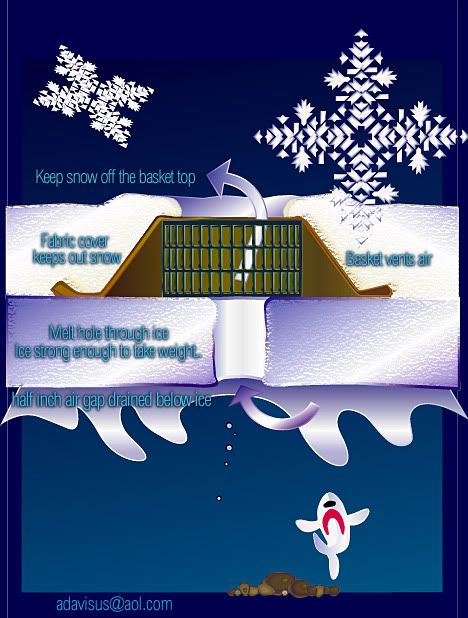'My solution' is to analyse the circumstances of the location, historical weather data, listen carefully to the experience of others who have significant interests and apply whatever methods are most appropriate to the circumstances.
To be ready well before the event... To the extent where at least two empty 1000' sq ft ponds are on standby in case several ponds are taken out by a drought / storm / leaks and have to be evacuated at short notice...
I keep a range of ponds, often heavily planted, often populated by turtles, fish, amphibians which may face two weeks or more of sub zero conditions quite capable of annihilating everything in the ponds (both lined and clay) I'm not in the habit of relying on pumps and junk science
I'm in the habit of using methods that work
That focuses on going to some lengths to maintain the inversion layer, to vent toxic gases, if necessary to resort to a double glazing technique if conditions are bad enough
Mucky, your first diagram is irrelevant to many ponds, that is relevant to natural lake owners with ponds deeper that six foot regarding the problem of oxygen depletion in Summer months when stratification affects deep water with aneirobic conditions. Relevant to folk who are in a position to accurately assess the bio load to arrive at an effective aeration installation (a substantial capitol cost, likely to be botched by amateurs) Apply that in Winter conditions to many folks ponds and you will accelerate ice thickness and severely jeopardise 'warm water' type fish aka not relevant to Winter inversion.
Your second diagram is irrelevant, most folk don't do ponds that bad. It refers to a schematic of Summer conditions in a pond assumed to be overloaded with mud, organic decay, zero level experience. Dig a hole, throw in a liner, throw in mud and fish and neglect it type pond. aka Nothing to do with inversion in Winter months.
Why are you referring to useless second hand references, out of context?
>>Folks are looking to prevent fish death in their ponds over Winter. What is YOUR solution?
This is substantially off topic so just a basic outline, I'm well headed toward a 'got better things to do' mentallity, with much more pleasant and useful things to get on with.
In previous years on a pond with too many fish a solution I resort to in weeks of sub zero weather is a double glazing technique with venting. Kinda mentioned this last year, and the year before that.... Some folk use Bickal de icers, or heat elements, (a tad dependant on risky electricity) or cover whole or part of the pond to similar effect (a very sound strategy, well executed)
Let's take an example of a 20'x6' two foot deep pond. Pond heavily planted... 30 fish, some a foot long. That's one fish every 4sq ft of pond. No pumps and junk. The weather forecast indicates extensive freeze for more than a week, likely freeze depth 18" (not good in a 24" pond) so, double glazing is implemented.

Ice layer is stopped at three inches thick, sub zero air is kept above the ice layer, water surface below is more or less kept frost free, all fish survive. A couple of inches depth freezing damage to plants. Sub zero weather lasts two weeks. When thaw sets in partial water change is applied to compensate for plants spoiled by three inch ice thickness.
Folk relying on pumps, aerators will be the ones to have the horrible casualty rates and bad fish conditions going into Spring, it usually sounds like the ghastly effect of circulating water, mechanical failures, prolonged sealed ice, time after time
I get to hear the same sob stories every Spring.... and puhleeeese, no need to mention Aquascape. Some of us have been having no significant casualties on ponds, year after year, long before Aquascape was around and never relied on (or payed for the $200 air compressor, 10c a megawatt or the $3000 solar pump) ham fisted mechanical solutions
There is quite a bit more to making a pond safe for fish through Winter besides having a clear knowledge of how inversion conditions can be used beneficially to an advantage, as that is wandering significantly off topic by all means go get second and third opinion from folk who really, reeeeeaally know their stuff and are inclined to go into detail at length
And have been doing it year, after year... Quite a few folk on pondboss are in the habit of right first time analysis, civil conversations, competent professional chit chats... With managing fish stocks, capitol costs, utility installations, the application of physics chemistry, engineering etc., you are looking towards seeking professional calibre experience of considerable depth, really.
Regards, andy
http://www.members.aol.com/abdavisnc/swglist.html